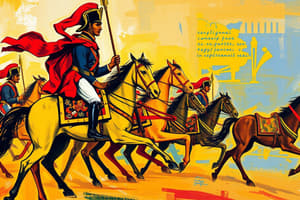Podcast
Questions and Answers
What was the primary cause of the 1798 Rebellion?
What was the primary cause of the 1798 Rebellion?
- The United Irishmen, wanting to unite all Irish people, sought to reduce British power in Ireland.
- The Protestant elite held most of the land and discriminated against Catholics and Presbyterians. (correct)
- The Catholic and Presbyterian populations faced discrimination and were pressured to pay taxes to a church they did not belong to.
- The influence of the American Revolution inspired Irish people to seek independence.
Which of these groups primarily advocated for the use of violence to achieve Irish independence?
Which of these groups primarily advocated for the use of violence to achieve Irish independence?
- Presbyterians
- Unionists
- Parliamentary Nationalists
- Physical Force Nationalists (correct)
What motivated the United Irishmen to form in 1791?
What motivated the United Irishmen to form in 1791?
- To repeal the Penal Laws and achieve full political equality for all Irish citizens.
- To unite Catholics and Protestants in a fight against British rule. (correct)
- To secure French military aid for an invasion of Ireland.
- To enact legislation to establish a Catholic church in Ireland.
Which of the following events directly contributed to the 1798 Rebellion?
Which of the following events directly contributed to the 1798 Rebellion?
Which of these battle locations was NOT a major site of fighting during the 1798 Rebellion?
Which of these battle locations was NOT a major site of fighting during the 1798 Rebellion?
How did the British government react to the growing threat posed by the United Irishmen?
How did the British government react to the growing threat posed by the United Irishmen?
The 1798 Rebellion had a significant impact on the relationship between Ireland and Britain. What was a direct consequence of the rebellion?
The 1798 Rebellion had a significant impact on the relationship between Ireland and Britain. What was a direct consequence of the rebellion?
Which of the following statements accurately describes the outcome of the 1798 Rebellion?
Which of the following statements accurately describes the outcome of the 1798 Rebellion?
Flashcards
1798 Rebellion
1798 Rebellion
The Irish rebellion of 1798 was a major uprising against British rule in Ireland. It was sparked by a range of grievances, including religious discrimination, poverty, and the influence of revolutionary ideas.
Protestant Ascendancy
Protestant Ascendancy
The 'Protestant Ascendancy' refers to the Protestant elite who held political and economic power in Ireland during the 18th century. They controlled the Irish parliament and most of the land, while discriminating against the majority Catholic population.
Penal Laws
Penal Laws
The Penal Laws were a series of discriminatory laws enforced by the British government against Irish Catholics. These laws limited their rights, property ownership, and religious freedom.
United Irishmen
United Irishmen
Signup and view all the flashcards
Wolfe Tone
Wolfe Tone
Signup and view all the flashcards
The Rising (1798)
The Rising (1798)
Signup and view all the flashcards
Failed French Help (1796)
Failed French Help (1796)
Signup and view all the flashcards
Consequences of the Rebellion
Consequences of the Rebellion
Signup and view all the flashcards
Study Notes
1798 Rebellion Background
- Ireland in the 18th century was divided between nationalist and unionist viewpoints.
- Nationalism, advocating for independence, was primarily held by Catholics, with two approaches: parliamentary means and armed rebellion.
- Unionism, supporting British rule, was largely Protestant.
Causes of the Rebellion
- Protestant Ascendancy: The Protestant elite controlled Irish politics and land, discriminating against Catholics (75% of the population) and Presbyterians (10%) through Penal Laws.
- Catholic and Presbyterian Discontent: Discrimination and tithes (taxes) to the Protestant Church fuelled resentment.
- Poverty: Population growth and land division caused poverty among tenant farmers and laborers.
- Revolutionary Influences: The American and French Revolutions inspired ideas of liberty and equality, particularly among Presbyterians.
- United Irishmen: This group, formed in 1791, aimed for Irish unity and reduced British power. Initially seeking parliamentary reform, they later planned armed rebellion.
- British Repression: The British government banned the United Irishmen and suppressed dissent using violence and arrests.
Course of the Rebellion
- Failed French Aid (1796): A planned French invasion was thwarted by bad weather.
- The Rising (1798):
- Small-scale rebellions in Dublin, Kildare, and Meath failed quickly.
- Wexford rebellion, led by Murphy & Harvey, achieved some early victories, but ended with a defeat at Vinegar Hill. Rebel atrocities, including killings of Protestants, occurred.
- Ulster uprisings, led by McCracken & Munro, were suppressed and resulted in executions.
- French landings in Mayo, led by General Humbert, were initially successful but ultimately defeated at Ballinamuck. Wolfe Tone was captured and committed suicide.
Consequences of the Rebellion
- Massive Casualties: 10,000-30,000 deaths and extensive destruction in towns like New Ross.
- Act of Union (1801): The Irish parliament was abolished and Ireland was directly ruled from Westminster.
- Religious Division: The rebellion exacerbated existing tensions between Catholics and Protestants.
- Long-Term Legacy: Inspired future Irish nationalist movements, including Emmet, Young Ireland, and Fenian risings, promoting the idea of Irish republicanism as a goal.
- The 1798 rebellion, though unsuccessful, is a key event in Irish history, profoundly impacting Irish politics and nationalism.
Studying That Suits You
Use AI to generate personalized quizzes and flashcards to suit your learning preferences.




